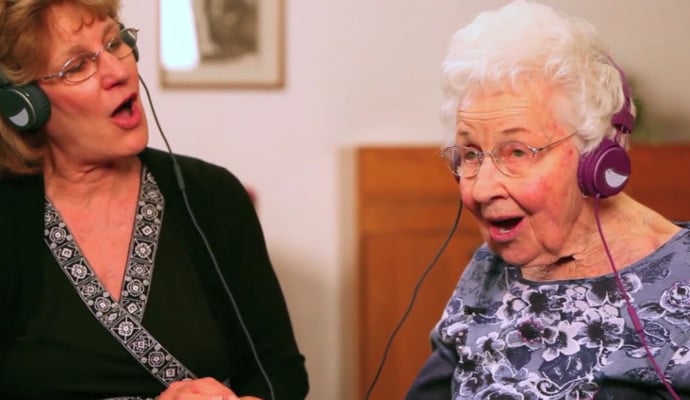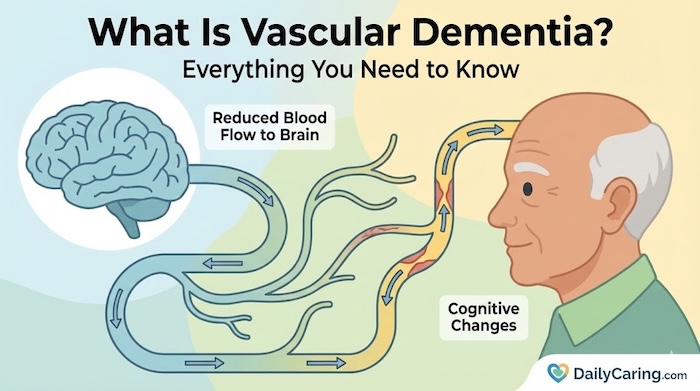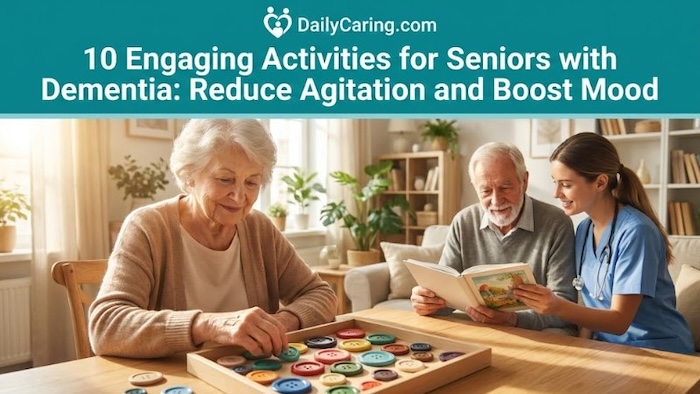In dementia caregiving, you can be in a room full of people, yet feel utterly alone. The person you once confided in may no longer be able to hold a conversation, and friends who don't understand your new reality may have slowly drifted away.
This isn't just loneliness; it's a deep, aching isolation that can become a constant companion, even as you give care. This feeling is one of the heaviest burdens a caregiver carries, but it is not one you are destined to bear forever.

Let's explore four compassionate and practical ways to reconnect with the world beyond your caregiving role and begin replenishing your own spirit.
Caregiver loneliness makes dementia care more challenging
When you’re caring for an older adult with Alzheimer's disease or dementia, loneliness is a familiar feeling.
It might feel like nobody else understands what you’re going through, even if you have a sound support system.
You might also avoid sharing the full details of the situation with family or friends to protect them from the harsh reality.
This can compound the stress and make you feel more alone.
Dr. Barry J. Jacobs writes about caregiver loneliness in dementia care and shares 4 tips to help overcome it and achieve greater balance.
As a member of the AARP Caregiver Expert Panel and a clinical psychologist and family therapist, Dr. Jacobs is an expert on the challenges of caregiving.
Here, we summarize essential tips from his article and add practical suggestions.
4 tips to overcome caregiver loneliness from Dr. Jacobs
1. Connect with people
You need caring people in your life to support you as you care for your older adult.
Even though you may need to make an effort to keep them close, reach out to family and friends. Those relationships help you reduce stress, prevent isolation, and boost your mood.
A caregiver support group is another excellent place to meet people who are in situations similar to yours – there are in-person and online groups.
In these groups, fellow caregivers will understand what you’re going through.
You might even be more comfortable sharing the not-so-positive details of your caregiving life and how you’re genuinely feeling than you would with family or friends.
2. Lean on deeper relationships too
It’s great to have people to get coffee or lunch with, but to ease loneliness, it also helps to have deeper relationships.
These are the people you feel comfortable sharing your real feelings with – good and evil. You can truly confide in them and trust that they’ll be supportive.
3. Express your true feelings
You might think that sharing any negative feelings will make you a burden on others or sink you into a depression.
But sharing and connecting with others will lighten your emotional load. It will also help others better understand the situation so they can better support you.
If you’re not comfortable speaking so openly with the people in your life, you might consider speaking with a counselor or a faith leader.
They’re trained to listen and not judge, and you may feel freer to share your inner thoughts with a neutral person outside of your social circle.
4. Accept praise
You might instinctively wave away any praise from family or friends.
It could be because you don’t feel you deserve it, or because you think they don’t know enough about the situation.
But it’s essential to accept praise. It’s another way to connect with people who care about you and allow them to provide support by cheering you on.
Final Thoughts About Caregiver Loneliness
Overcoming caregiver loneliness is not about adding more social obligations to your overflowing plate. It's about seeking meaningful connections that acknowledge your reality and refill your cup.
By taking even a small step—whether it's joining an online support group or simply sharing your story with one person who gets it—you are rebuilding your bridge to the world.
Remember, seeking connection isn't a luxury; it is a vital form of sustenance for the long caregiving journey. You deserve to be seen, heard, and supported just as much as you provide that care for your loved one.
Next Steps: Get advice from Dr. Barry J. Jacobs on how to overcome loneliness in dementia caregiving at AARP
Recommended for you:














Just like the rest of the world, 2020 was a difficult time for us. I’ve been a caregiver for my Mother who has vascular dementia since 2019. My Husband and I moved into her home because this was a simpler way to care for her, and we pay rent to my stepfather for the privilege.
I manage her money, my households money, am power of attorney, and employed full time. I’ve been working from home in the last year, both a blessing and a curse, but as she declines I don’t know how I’ll be able to go back.
It’s hard to anyone, my own partner doesn’t get it and emotionally shuts down whenever something touches a nerve. I drown everyday, but won’t tell a soul because they won’t believe me or help. Caregiving is tough and I commend you all and send love your way.
It’s wonderful that you’re able to care for your mother and so tough to manage so many responsibilities. It may help to talk with other caregivers who are often going through similar challenges and dealing with similar emotions. We’ve got a list of great private support groups on Facebook here – https://dailycaring.com/support-groups-for-caregivers-on-facebook/
An online group can’t take the place or actually being around someone, and I have found that in looking after my parents, that church they went to so loyally never offered to help out. Maybe a few sent cards now and then. My parents said, what happened to all these people we used to know – don’t they care? I used to take food to events that were organized but no one brings food to us. Being in a small town is a handicap also – even before the virus there was not many events or groups. With the virus now turning out to be a long term thing – the social isolation is going to get worse for a lot of people
It’s true, online interactions will never replace seeing people in person. But for now, to keep everyone safer, it’s important to reduce contact to reduce exposure to Covid-19.
Hopefully having regular online interactions will help reduce the feelings of isolation, even though it’s not a perfect substitute for in-person visits.
We’re so sorry to hear that the church community hasn’t been there to support your parents and you 🙁
Thank you for this article. I am one of those who would rather share the challenges of caregiving to my Mum who has dementia/Alzheimer with strangers rather than my own family because in African culture it is expected that the eldest child should automatically do this. There is a sense that it should be done without complaining or expressing one’s true feelings which would be taboo even to truly talk about what one feels. So there is a lot of bottling up of feelings and resentment towards family especially who in reality have no idea what I am going through. Also, the fact that I moved in to her house to take better care of her (we cannot afford caregivers as a family) I should be “thankful” that I am saving on rent and should fully contribute towards her care. Frankly, support from my immediate family and even my own siblings is very, very negligible. They will only step in when I request e.g. for hospital visits, etc. Otherwise, its hands-off from everybody whereby I am stressed out as a working professional and a mother myself trying to juggle all these things. I forgot to mention that in this part of the world (Africa), it is frowned upon to take aging parents to care homes. It would be the talk of the century!!!!
Different cultures absolutely have different expectations around caregiving. Regardless, you have every right to feel the way you do and to get the help that you need. And if family won’t help, then it makes sense to hire someone to help.
In case you feel like talking about your experience with others who are going through similar things, an online caregiver support group may be helpful. Some suggestions here – 11 Private Support Groups for Caregivers on Facebook https://dailycaring.com/support-groups-for-caregivers-on-facebook/
If caregivers had family and friends for support, of course they would be less lonely and depressed. But the reality is very few people care about dementia patients or their caregivers. Family and friends quietly disappear because most don’t want to be bothered. It is the exceptional few that are willing to listen and be supportive. It is practically nonexistent the number who will actually help without expecting to be paid.
Caregiving support groups mostly reinforce what people already know and that isn’t necessarily uplifting. Counseling, whether online or in person, cannot change the circumstances, and is often dependent on payment.
There needs to be much more publicly funded support because most families run out of money. But even in this circumstance, helping others is little more than a job. People get burned out and numb to caring.
Exceptionally few people care and will volunteer for strangers. If more did, burdens could be more widely shared.
Everyone is in a different situation when it comes to their support network. Some are fortunate to get wonderful support from family and friends and others don’t get the help they need and deserve.
Similarly, many people have found that caregiver support groups and counseling or therapy are great ways to get added support and help them get through difficult situations. Each person is different, so it’s worth a try to see if a particular type of support will work for you.
There absolutely should be more government assistance for caregivers. But there are programs available can help pay for care and other related expenses. These articles point to a variety of financial and supportive resources for caregivers:
— Benefits Programs Help Pay for Caregiving Expenses https://dailycaring.com/financial-help-caregiving-expenses/
— 3 Ways of Getting Paid as a Family Caregiver: Government Benefits Programs https://dailycaring.com/3-ways-of-getting-paid-as-a-family-caregiver-government-benefits-programs/
— How Medicaid Spend Down Helps Seniors Qualify for Long Term Care Benefits https://dailycaring.com/how-medicaid-spend-down-helps-seniors-qualify-for-long-term-care-benefits/
— 7 Sources of Home Repair Assistance for Seniors https://dailycaring.com/7-sources-of-home-repair-assistance-for-seniors/
— SNAP Benefits for Seniors: 7 Key Food Assistance Program Facts https://dailycaring.com/snap-benefits-for-seniors-7-key-food-assistance-program-facts/
— All our articles about financial assistance: https://dailycaring.com/tag/financial-help/
Really a nice blog to share and discussing the caregiver loneliness and how she feels isolated from others thus making the dementia care even harder. Thanks for the informative blog. Keep sharing such more blogs.
So glad this article is helpful!